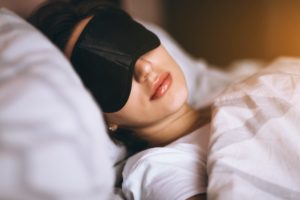Can a Lack of Sleep Cause Nausea?
Nausea is a feeling of being sick to the stomach and is a common symptom of many ailments. While nausea can be a sign of underlying illness, most cases of nausea are not serious. Anyone who has experienced food poisoning, migraines, noxious odors, or motion sickness may have felt nauseous.
Some people who do not get enough sleep may also have this unpleasant experience. Their nausea may be accompanied by gas, stomach pain, diarrhea, and related problems. We take a closer look at why this may happen and how to relieve these symptoms when it does.
Is Your Troubled Sleep a Health Risk?
A variety of issues can cause problems sleeping. Answer three questions to understand if it’s a concern you should worry about.
How Sleep Deprivation Can Lead to Nausea
While nausea is a recognized symptom of sleep deprivation and disrupted sleep, scientists are still learning more about this connection. Researchers have explored the relationship between sleep and the immune system, as well as the role that sleep plays in gastrointestinal diseases.
Inflammation
Studies show that not getting enough sleep increases the activity of the immune system in a cascade of events. One result is that the body’s immune cells overproduce proteins called pro-inflammatory cytokines. These substances increase inflammation in tissues throughout the body, including the digestive organs, and can trigger uncomfortable symptoms.
Inflammation of the intestines, caused by poor or insufficient sleep , may be responsible for symptoms like nausea. If the sleep deprivation continues long-term, however, it may be associated with changes in the digestive tract that can lead to chronic disorders.
Gastrointestinal Disorders
Research studies have linked sleep deprivation to disorders of the stomach and intestines that can cause nausea and other symptoms. In some studies people with insufficient sleep had higher rates of these disorders. Other studies showed that sleep deprivation increased the symptoms and severity of a diagnosed gastrointestinal disorder.
- Inflammatory bowel disease (IBD): IBD is defined by long-term inflammation of the inner lining of the colon , which can cause bleeding and ulcers.
- Irritable bowel syndrome (IBS): IBS causes abdominal pain , cramping, and discomfort, as well as a change in bowel habits.
- Crohn’s disease: This type of IBD is associated with cramping, weight loss, fever, fatigue, and watery diarrhea.
- Gastroesophageal reflux disease (GERD): With GERD, contents from the stomach back up into the esophagus , causing a burning feeling in the throat or chest.
- Peptic ulcer: A peptic ulcer is a sore in the stomach lining or lining of the small intestine that causes burning pain in the stomach.
- Colon cancer: This disease forms tumors that begin in the large intestine.
How Does Sleep Deprivation Impact Your Body?
Sleep is necessary for virtually all the body’s systems to function properly . In addition to affecting the digestive system, sleep deprivation can raise the risk of heart problems, high blood pressure, diabetes, obesity, and other chronic conditions. Sleep deprivation can also affect the immune system and leave a person more vulnerable to infection.
Furthermore, not sleeping well can take a toll on mental and emotional health. Studies have linked sleep deprivation to cognitive impairment, including problems with attention, critical thinking, judgment, and problem solving. Without enough sleep, a person’s moods, emotions, and sex drive may suffer as well.
How to Remedy Nausea
If you are feeling nauseous after a night of poor sleep, a few simple remedies may help you manage your nausea.
- Drink enough water: Medical recommendations typically suggest between 8 to 10 glasses a day to avoid dehydration.
- Try sitting quietly: For some people, moving around makes their nausea worse.
- Change positions: If lying down makes nausea worse, try sitting up and vice versa.
- Eat smaller meals: Rather than having three large meals, try eating six or eight smaller meals during the day.
- Avoid fatty, spicy, or salty foods: Instead, try bland foods such as soda crackers, toast, potatoes, noodles, or rice.
- Avoid unpleasant smells: Strong odors can make a person nauseous or make their nausea worse.
- Get fresh air: Open a window or go outside.
- Distract yourself: Watch a movie, read a book, or play a game to distract your mind from focusing on your nausea.
- Talk with a doctor: A health professional can discuss the risks and benefits of anti-nausea medications and other possible interventions.

Tips for Sleeping Better
Taking steps to improve sleep hygiene can result in longer and higher-quality sleep.
- Establish consistent bedtimes and wake-ups: Try to go to bed and wake up at the same times every day , even on weekends.
- Incorporate bedtime routines and habits: A bedtime routine may include brushing teeth and other personal hygiene, dimming lights, reading a book, and reducing noise.
- Remove screens from the bedroom: Using smartphones, computers, TVs, and gaming laptops just before sleeping can keep the brain awake and alert.
- Exercise: Daily physical activity can help people fall asleep more easily at night, as well as improve sleep quality and quantity.
- Limit naps: Taking naps, especially napping for longer than 30 minutes or in the late afternoon, can make it more challenging to fall asleep at bedtime.
- Keep the bedroom cozy: Create a sleep space that is quiet, relaxing, and temperature controlled, with comfortable bedding and pillows.
- Avoid caffeine, alcohol, cigarettes, and large meals before bedtime: All of these have been shown to disrupt sleep and reduce overall sleep quality.
When to Talk to Your Doctor
If nausea persists or is accompanied by other symptoms, consider contacting your doctor. Symptoms such as vomiting longer than 24 hours, vomiting blood, abdominal pain, headache, or signs of dehydration may indicate a more serious medical condition.
If sleep deprivation is chronic or unmanageable, ask a doctor or trusted health professional for help . A doctor’s visit to discuss sleep issues and nausea may include:
- A full medical history
- Listing current and past medications
- Assessing sleep habits and sleep patterns
- Discussing a sleep diary to record sleep and wake times
- Providing medical guidance and possible treatment recommendations
- A referral to a gastroenterologist, a sleep clinic, or both

Still have questions? Ask our community!
Join our Sleep Care Community — a trusted hub of sleep health professionals, product specialists, and people just like you. Whether you need expert sleep advice for your insomnia or you’re searching for the perfect mattress, we’ve got you covered. Get personalized guidance from the experts who know sleep best.
References
13 Sources
-
Cremonini, F., Camilleri, M., Zinsmeister, A. R., Herrick, L. M., Beebe, T., & Talley, N. J. (2009). Sleep disturbances are linked to both upper and lower gastrointestinal symptoms in the general population. Neurogastroenterology and Motility, 21(2), 128–135., Retrieved May 12, 2022, from
https://pubmed.ncbi.nlm.nih.gov/18823289/ -
Ali, T., Choe, J., Awab, A., Wagener, T. L., & Orr, W. C. (2013). Sleep, immunity and inflammation in gastrointestinal disorders. World Journal of Gastroenterology, 19(48), 9231–9239.
https://pubmed.ncbi.nlm.nih.gov/24409051/ -
Khanijow, V., Prakash, P., Emsellem, H. A., Borum, M. L., & Doman, D. B. (2015). Sleep dysfunction and gastrointestinal diseases. Gastroenterology & Hepatology, 11(12), 817–825.
https://pubmed.ncbi.nlm.nih.gov/27134599/ -
A.D.A.M. Medical Encyclopedia. (2020, January 9). Inflammatory bowel disease – series—Indications. MedlinePlus., Retrieved May 28, 2022, from
https://medlineplus.gov/ency/presentations/100171_2.htm -
A.D.A.M. Medical Encyclopedia. (2021, April 19). Irritable bowel syndrome. MedlinePlus., Retrieved May 28, 2022, from
https://medlineplus.gov/ency/article/000246.htm -
A.D.A.M. Medical Encyclopedia. (2020, January 9). Crohn disease. MedlinePlus., Retrieved May 28, 2022, from
https://medlineplus.gov/ency/article/000249.htm -
A.D.A.M. Medical Encyclopedia [Internet]. Atlanta (GA): A.D.A.M., Inc.; c1997-2019. Gastroesophageal reflux disease., Retrieved May 28, 2022, from
https://medlineplus.gov/ency/article/000265.htm -
MedlinePlus: National Library of Medicine (US). (2016, May 20). Peptic ulcer., Retrieved May 28, 2022, from
https://medlineplus.gov/pepticulcer.html -
National Cancer Institute. (n.d.). Dictionary: Colon cancer., Retrieved May 28, 2022, from
https://www.cancer.gov/publications/dictionaries/cancer-terms/def/colon-cancer -
National Institute of Neurological Disorders and Stroke. (2022, April 1). Brain basics: Understanding sleep., Retrieved May 28, 2022, from
https://www.ninds.nih.gov/health-information/patient-caregiver-education/brain-basics-understanding-sleep -
A.D.A.M. Medical Encyclopedia. (2020, July 13). When you have nausea and vomiting. MedlinePlus., Retrieved May 12, 2022, from
https://medlineplus.gov/ency/patientinstructions/000122.htm -
Maski, K. (2021, February 19). Insufficient sleep: Evaluation and management. In T. E. Scammell (Ed.). UpToDate., Retrieved May 12, 2022, from
https://www.uptodate.com/contents/insufficient-sleep-evaluation-and-management -
National Center for Chronic Disease Prevention and Health Promotion, Division of Population Health. (2016, July 15). Tips for better sleep. Centers for Disease Control and Prevention., Retrieved May 12, 2022, from
https://www.cdc.gov/sleep/about_sleep/sleep_hygiene.html

































































